An Evaluation of British Military Leadership in the First World War
VerifiedAdded on 2020/10/05
|9
|3037
|451
Essay
AI Summary
This essay provides an in-depth analysis of British military leadership during the First World War, focusing on the assessment of 'lions led by donkeys.' The introduction sets the stage by outlining the key events and causes of the war, including the assassination of Archduke Franz Ferdinand and the subsequent alliances that led to global conflict. The main body delves into the strategies, operations, and technologies of the war, including trench warfare and the introduction of new weaponry. The essay specifically examines the performance of British generals, particularly Field Marshal Haig, and evaluates the fairness of the 'lions led by donkeys' assessment, considering the immense loss of life and the challenges faced by soldiers. The essay explores the impact of the war on various nations, the role of technology, and reasons for Germany's defeat. The conclusion summarizes the key arguments and provides an overall assessment of British military leadership during the First World War.
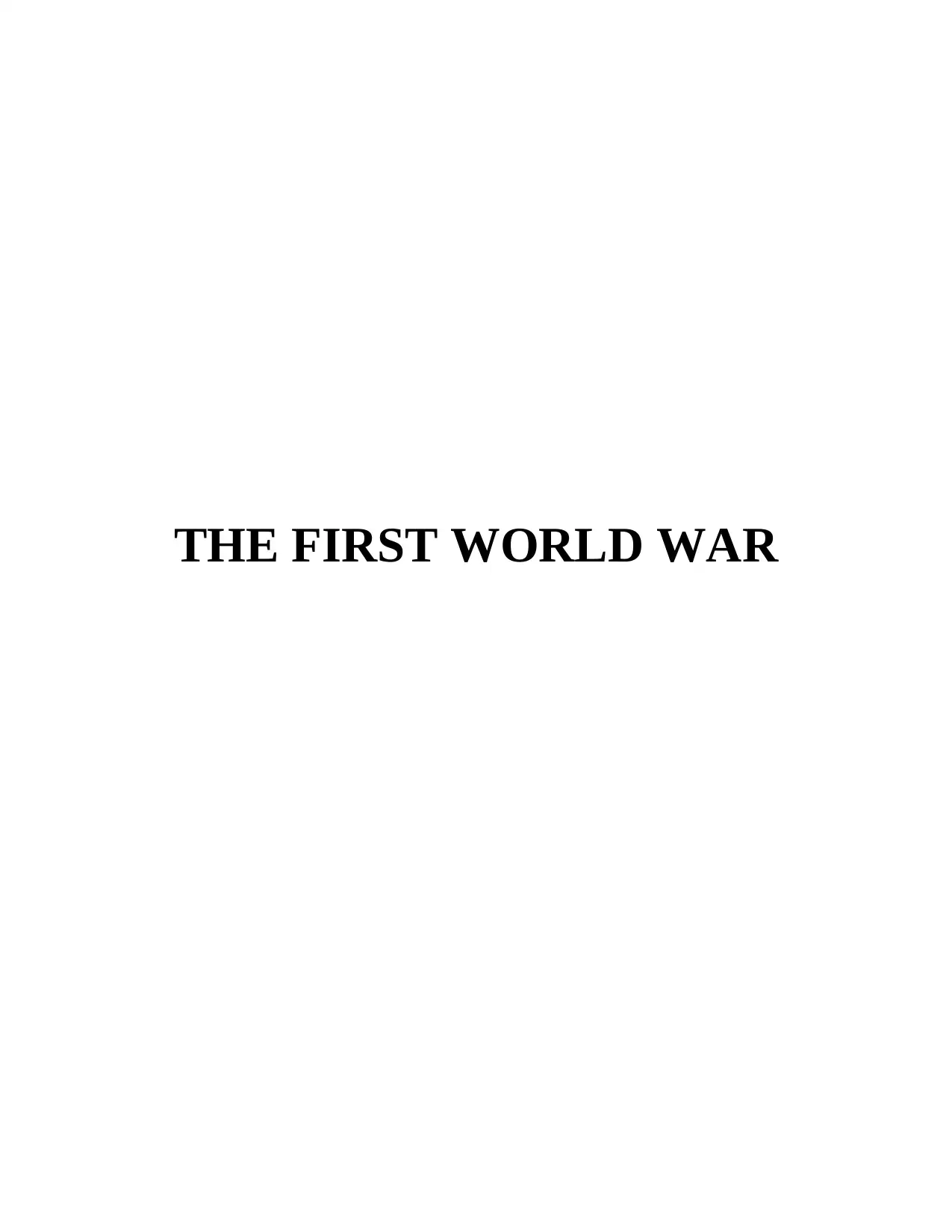
THE FIRST WORLD WAR
Paraphrase This Document
Need a fresh take? Get an instant paraphrase of this document with our AI Paraphraser
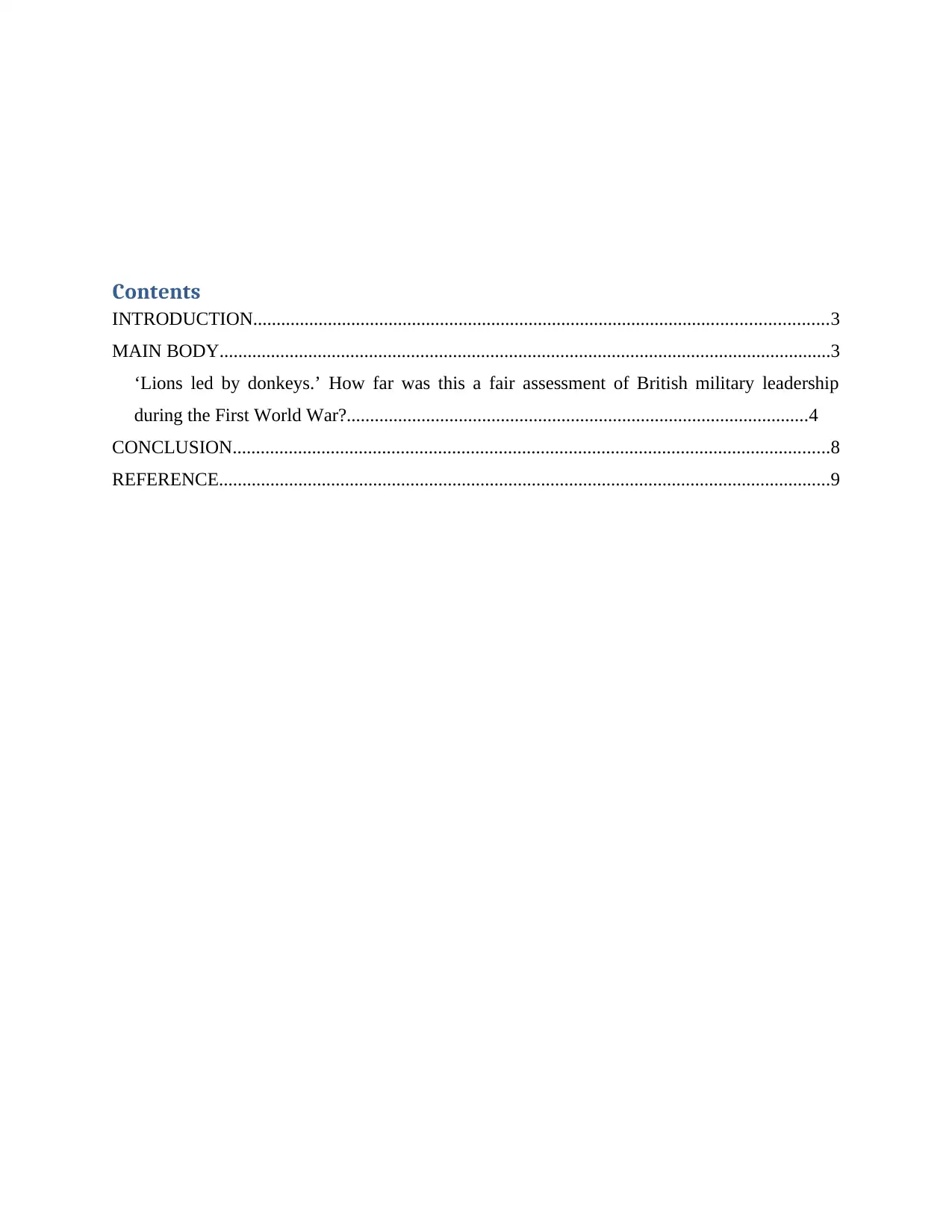
Contents
INTRODUCTION...........................................................................................................................3
MAIN BODY...................................................................................................................................3
‘Lions led by donkeys.’ How far was this a fair assessment of British military leadership
during the First World War?...................................................................................................4
CONCLUSION................................................................................................................................8
REFERENCE...................................................................................................................................9
INTRODUCTION...........................................................................................................................3
MAIN BODY...................................................................................................................................3
‘Lions led by donkeys.’ How far was this a fair assessment of British military leadership
during the First World War?...................................................................................................4
CONCLUSION................................................................................................................................8
REFERENCE...................................................................................................................................9
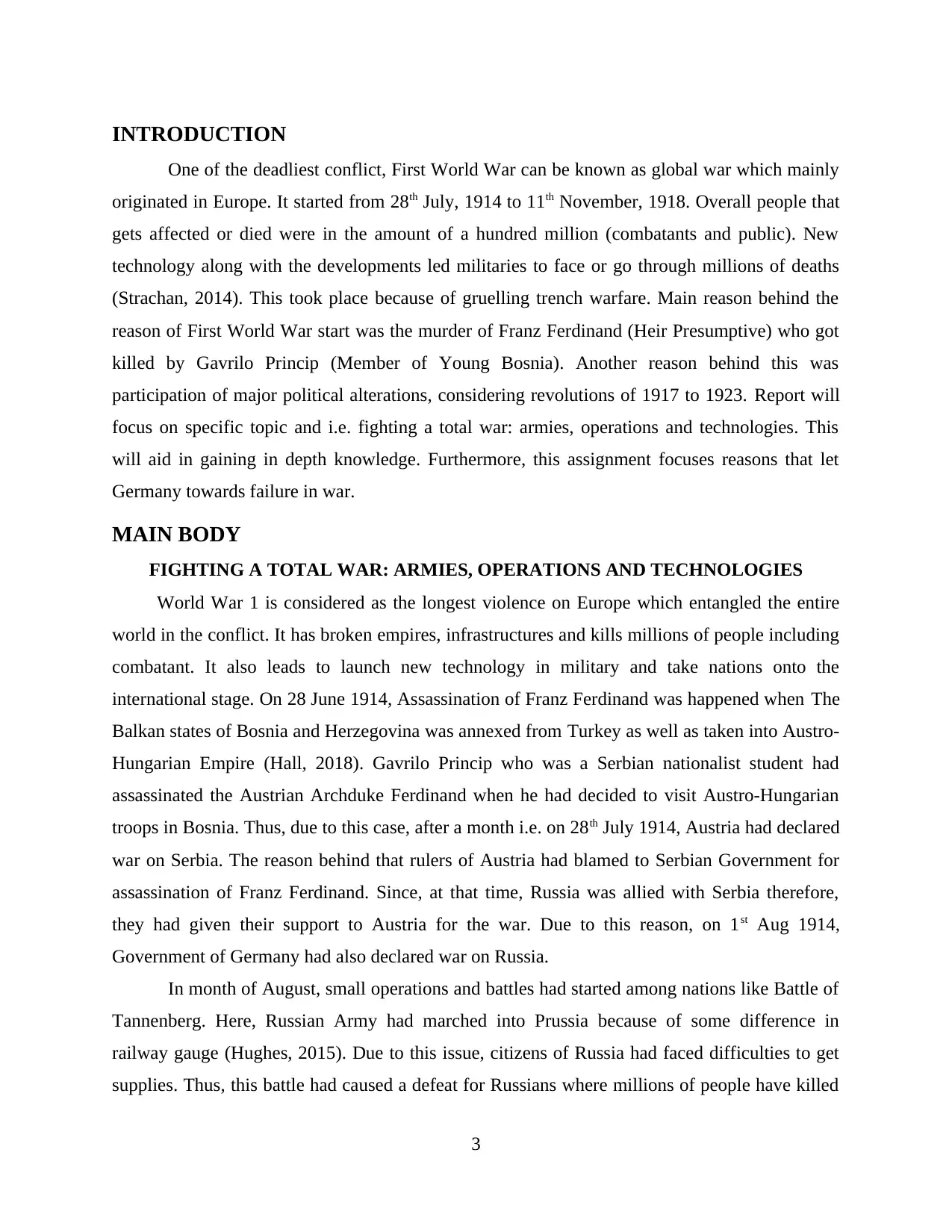
INTRODUCTION
One of the deadliest conflict, First World War can be known as global war which mainly
originated in Europe. It started from 28th July, 1914 to 11th November, 1918. Overall people that
gets affected or died were in the amount of a hundred million (combatants and public). New
technology along with the developments led militaries to face or go through millions of deaths
(Strachan, 2014). This took place because of gruelling trench warfare. Main reason behind the
reason of First World War start was the murder of Franz Ferdinand (Heir Presumptive) who got
killed by Gavrilo Princip (Member of Young Bosnia). Another reason behind this was
participation of major political alterations, considering revolutions of 1917 to 1923. Report will
focus on specific topic and i.e. fighting a total war: armies, operations and technologies. This
will aid in gaining in depth knowledge. Furthermore, this assignment focuses reasons that let
Germany towards failure in war.
MAIN BODY
FIGHTING A TOTAL WAR: ARMIES, OPERATIONS AND TECHNOLOGIES
World War 1 is considered as the longest violence on Europe which entangled the entire
world in the conflict. It has broken empires, infrastructures and kills millions of people including
combatant. It also leads to launch new technology in military and take nations onto the
international stage. On 28 June 1914, Assassination of Franz Ferdinand was happened when The
Balkan states of Bosnia and Herzegovina was annexed from Turkey as well as taken into Austro-
Hungarian Empire (Hall, 2018). Gavrilo Princip who was a Serbian nationalist student had
assassinated the Austrian Archduke Ferdinand when he had decided to visit Austro-Hungarian
troops in Bosnia. Thus, due to this case, after a month i.e. on 28th July 1914, Austria had declared
war on Serbia. The reason behind that rulers of Austria had blamed to Serbian Government for
assassination of Franz Ferdinand. Since, at that time, Russia was allied with Serbia therefore,
they had given their support to Austria for the war. Due to this reason, on 1st Aug 1914,
Government of Germany had also declared war on Russia.
In month of August, small operations and battles had started among nations like Battle of
Tannenberg. Here, Russian Army had marched into Prussia because of some difference in
railway gauge (Hughes, 2015). Due to this issue, citizens of Russia had faced difficulties to get
supplies. Thus, this battle had caused a defeat for Russians where millions of people have killed
3
One of the deadliest conflict, First World War can be known as global war which mainly
originated in Europe. It started from 28th July, 1914 to 11th November, 1918. Overall people that
gets affected or died were in the amount of a hundred million (combatants and public). New
technology along with the developments led militaries to face or go through millions of deaths
(Strachan, 2014). This took place because of gruelling trench warfare. Main reason behind the
reason of First World War start was the murder of Franz Ferdinand (Heir Presumptive) who got
killed by Gavrilo Princip (Member of Young Bosnia). Another reason behind this was
participation of major political alterations, considering revolutions of 1917 to 1923. Report will
focus on specific topic and i.e. fighting a total war: armies, operations and technologies. This
will aid in gaining in depth knowledge. Furthermore, this assignment focuses reasons that let
Germany towards failure in war.
MAIN BODY
FIGHTING A TOTAL WAR: ARMIES, OPERATIONS AND TECHNOLOGIES
World War 1 is considered as the longest violence on Europe which entangled the entire
world in the conflict. It has broken empires, infrastructures and kills millions of people including
combatant. It also leads to launch new technology in military and take nations onto the
international stage. On 28 June 1914, Assassination of Franz Ferdinand was happened when The
Balkan states of Bosnia and Herzegovina was annexed from Turkey as well as taken into Austro-
Hungarian Empire (Hall, 2018). Gavrilo Princip who was a Serbian nationalist student had
assassinated the Austrian Archduke Ferdinand when he had decided to visit Austro-Hungarian
troops in Bosnia. Thus, due to this case, after a month i.e. on 28th July 1914, Austria had declared
war on Serbia. The reason behind that rulers of Austria had blamed to Serbian Government for
assassination of Franz Ferdinand. Since, at that time, Russia was allied with Serbia therefore,
they had given their support to Austria for the war. Due to this reason, on 1st Aug 1914,
Government of Germany had also declared war on Russia.
In month of August, small operations and battles had started among nations like Battle of
Tannenberg. Here, Russian Army had marched into Prussia because of some difference in
railway gauge (Hughes, 2015). Due to this issue, citizens of Russia had faced difficulties to get
supplies. Thus, this battle had caused a defeat for Russians where millions of people have killed
3
⊘ This is a preview!⊘
Do you want full access?
Subscribe today to unlock all pages.

Trusted by 1+ million students worldwide
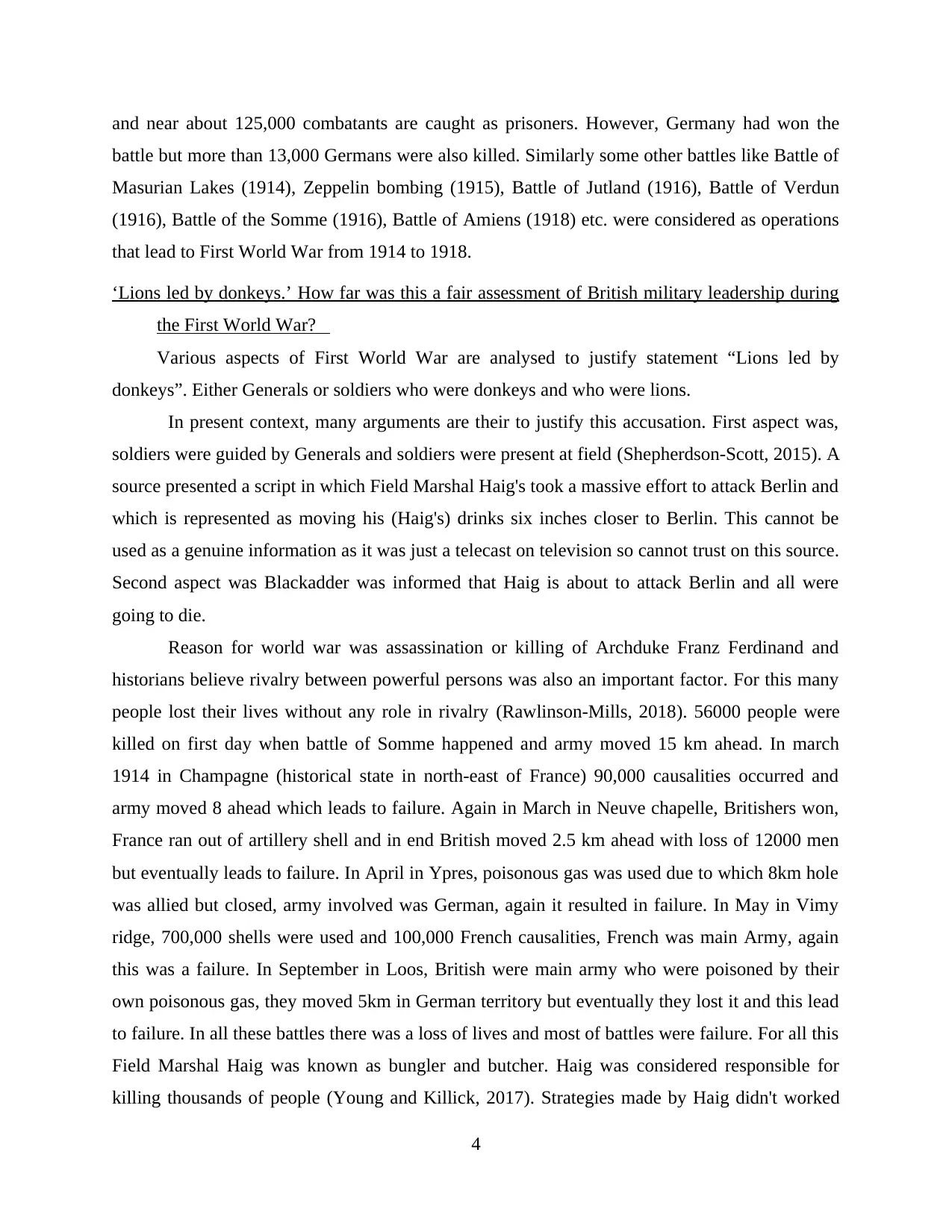
and near about 125,000 combatants are caught as prisoners. However, Germany had won the
battle but more than 13,000 Germans were also killed. Similarly some other battles like Battle of
Masurian Lakes (1914), Zeppelin bombing (1915), Battle of Jutland (1916), Battle of Verdun
(1916), Battle of the Somme (1916), Battle of Amiens (1918) etc. were considered as operations
that lead to First World War from 1914 to 1918.
‘Lions led by donkeys.’ How far was this a fair assessment of British military leadership during
the First World War?
Various aspects of First World War are analysed to justify statement “Lions led by
donkeys”. Either Generals or soldiers who were donkeys and who were lions.
In present context, many arguments are their to justify this accusation. First aspect was,
soldiers were guided by Generals and soldiers were present at field (Shepherdson-Scott, 2015). A
source presented a script in which Field Marshal Haig's took a massive effort to attack Berlin and
which is represented as moving his (Haig's) drinks six inches closer to Berlin. This cannot be
used as a genuine information as it was just a telecast on television so cannot trust on this source.
Second aspect was Blackadder was informed that Haig is about to attack Berlin and all were
going to die.
Reason for world war was assassination or killing of Archduke Franz Ferdinand and
historians believe rivalry between powerful persons was also an important factor. For this many
people lost their lives without any role in rivalry (Rawlinson-Mills, 2018). 56000 people were
killed on first day when battle of Somme happened and army moved 15 km ahead. In march
1914 in Champagne (historical state in north-east of France) 90,000 causalities occurred and
army moved 8 ahead which leads to failure. Again in March in Neuve chapelle, Britishers won,
France ran out of artillery shell and in end British moved 2.5 km ahead with loss of 12000 men
but eventually leads to failure. In April in Ypres, poisonous gas was used due to which 8km hole
was allied but closed, army involved was German, again it resulted in failure. In May in Vimy
ridge, 700,000 shells were used and 100,000 French causalities, French was main Army, again
this was a failure. In September in Loos, British were main army who were poisoned by their
own poisonous gas, they moved 5km in German territory but eventually they lost it and this lead
to failure. In all these battles there was a loss of lives and most of battles were failure. For all this
Field Marshal Haig was known as bungler and butcher. Haig was considered responsible for
killing thousands of people (Young and Killick, 2017). Strategies made by Haig didn't worked
4
battle but more than 13,000 Germans were also killed. Similarly some other battles like Battle of
Masurian Lakes (1914), Zeppelin bombing (1915), Battle of Jutland (1916), Battle of Verdun
(1916), Battle of the Somme (1916), Battle of Amiens (1918) etc. were considered as operations
that lead to First World War from 1914 to 1918.
‘Lions led by donkeys.’ How far was this a fair assessment of British military leadership during
the First World War?
Various aspects of First World War are analysed to justify statement “Lions led by
donkeys”. Either Generals or soldiers who were donkeys and who were lions.
In present context, many arguments are their to justify this accusation. First aspect was,
soldiers were guided by Generals and soldiers were present at field (Shepherdson-Scott, 2015). A
source presented a script in which Field Marshal Haig's took a massive effort to attack Berlin and
which is represented as moving his (Haig's) drinks six inches closer to Berlin. This cannot be
used as a genuine information as it was just a telecast on television so cannot trust on this source.
Second aspect was Blackadder was informed that Haig is about to attack Berlin and all were
going to die.
Reason for world war was assassination or killing of Archduke Franz Ferdinand and
historians believe rivalry between powerful persons was also an important factor. For this many
people lost their lives without any role in rivalry (Rawlinson-Mills, 2018). 56000 people were
killed on first day when battle of Somme happened and army moved 15 km ahead. In march
1914 in Champagne (historical state in north-east of France) 90,000 causalities occurred and
army moved 8 ahead which leads to failure. Again in March in Neuve chapelle, Britishers won,
France ran out of artillery shell and in end British moved 2.5 km ahead with loss of 12000 men
but eventually leads to failure. In April in Ypres, poisonous gas was used due to which 8km hole
was allied but closed, army involved was German, again it resulted in failure. In May in Vimy
ridge, 700,000 shells were used and 100,000 French causalities, French was main Army, again
this was a failure. In September in Loos, British were main army who were poisoned by their
own poisonous gas, they moved 5km in German territory but eventually they lost it and this lead
to failure. In all these battles there was a loss of lives and most of battles were failure. For all this
Field Marshal Haig was known as bungler and butcher. Haig was considered responsible for
killing thousands of people (Young and Killick, 2017). Strategies made by Haig didn't worked
4
Paraphrase This Document
Need a fresh take? Get an instant paraphrase of this document with our AI Paraphraser
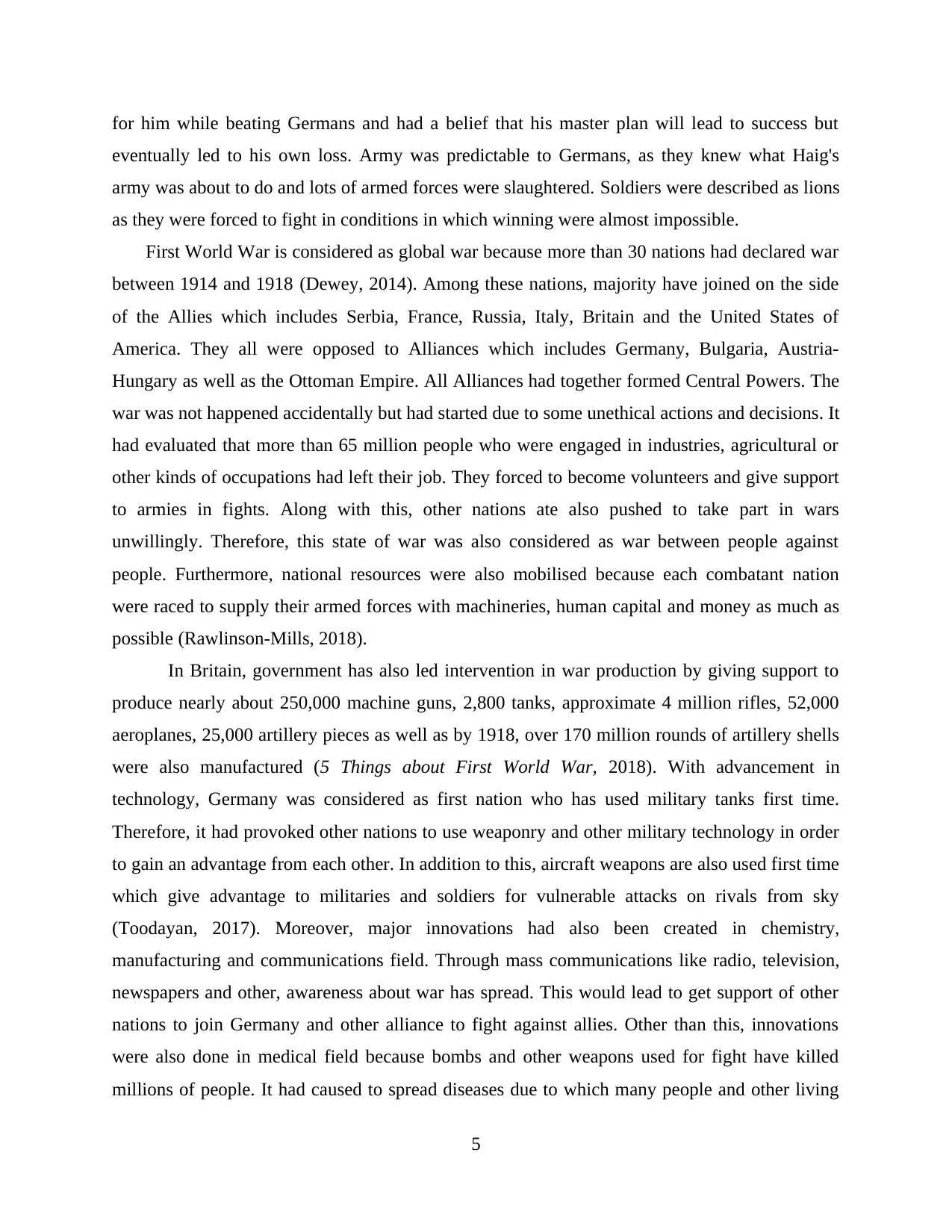
for him while beating Germans and had a belief that his master plan will lead to success but
eventually led to his own loss. Army was predictable to Germans, as they knew what Haig's
army was about to do and lots of armed forces were slaughtered. Soldiers were described as lions
as they were forced to fight in conditions in which winning were almost impossible.
First World War is considered as global war because more than 30 nations had declared war
between 1914 and 1918 (Dewey, 2014). Among these nations, majority have joined on the side
of the Allies which includes Serbia, France, Russia, Italy, Britain and the United States of
America. They all were opposed to Alliances which includes Germany, Bulgaria, Austria-
Hungary as well as the Ottoman Empire. All Alliances had together formed Central Powers. The
war was not happened accidentally but had started due to some unethical actions and decisions. It
had evaluated that more than 65 million people who were engaged in industries, agricultural or
other kinds of occupations had left their job. They forced to become volunteers and give support
to armies in fights. Along with this, other nations ate also pushed to take part in wars
unwillingly. Therefore, this state of war was also considered as war between people against
people. Furthermore, national resources were also mobilised because each combatant nation
were raced to supply their armed forces with machineries, human capital and money as much as
possible (Rawlinson-Mills, 2018).
In Britain, government has also led intervention in war production by giving support to
produce nearly about 250,000 machine guns, 2,800 tanks, approximate 4 million rifles, 52,000
aeroplanes, 25,000 artillery pieces as well as by 1918, over 170 million rounds of artillery shells
were also manufactured (5 Things about First World War, 2018). With advancement in
technology, Germany was considered as first nation who has used military tanks first time.
Therefore, it had provoked other nations to use weaponry and other military technology in order
to gain an advantage from each other. In addition to this, aircraft weapons are also used first time
which give advantage to militaries and soldiers for vulnerable attacks on rivals from sky
(Toodayan, 2017). Moreover, major innovations had also been created in chemistry,
manufacturing and communications field. Through mass communications like radio, television,
newspapers and other, awareness about war has spread. This would lead to get support of other
nations to join Germany and other alliance to fight against allies. Other than this, innovations
were also done in medical field because bombs and other weapons used for fight have killed
millions of people. It had caused to spread diseases due to which many people and other living
5
eventually led to his own loss. Army was predictable to Germans, as they knew what Haig's
army was about to do and lots of armed forces were slaughtered. Soldiers were described as lions
as they were forced to fight in conditions in which winning were almost impossible.
First World War is considered as global war because more than 30 nations had declared war
between 1914 and 1918 (Dewey, 2014). Among these nations, majority have joined on the side
of the Allies which includes Serbia, France, Russia, Italy, Britain and the United States of
America. They all were opposed to Alliances which includes Germany, Bulgaria, Austria-
Hungary as well as the Ottoman Empire. All Alliances had together formed Central Powers. The
war was not happened accidentally but had started due to some unethical actions and decisions. It
had evaluated that more than 65 million people who were engaged in industries, agricultural or
other kinds of occupations had left their job. They forced to become volunteers and give support
to armies in fights. Along with this, other nations ate also pushed to take part in wars
unwillingly. Therefore, this state of war was also considered as war between people against
people. Furthermore, national resources were also mobilised because each combatant nation
were raced to supply their armed forces with machineries, human capital and money as much as
possible (Rawlinson-Mills, 2018).
In Britain, government has also led intervention in war production by giving support to
produce nearly about 250,000 machine guns, 2,800 tanks, approximate 4 million rifles, 52,000
aeroplanes, 25,000 artillery pieces as well as by 1918, over 170 million rounds of artillery shells
were also manufactured (5 Things about First World War, 2018). With advancement in
technology, Germany was considered as first nation who has used military tanks first time.
Therefore, it had provoked other nations to use weaponry and other military technology in order
to gain an advantage from each other. In addition to this, aircraft weapons are also used first time
which give advantage to militaries and soldiers for vulnerable attacks on rivals from sky
(Toodayan, 2017). Moreover, major innovations had also been created in chemistry,
manufacturing and communications field. Through mass communications like radio, television,
newspapers and other, awareness about war has spread. This would lead to get support of other
nations to join Germany and other alliance to fight against allies. Other than this, innovations
were also done in medical field because bombs and other weapons used for fight have killed
millions of people. It had caused to spread diseases due to which many people and other living
5
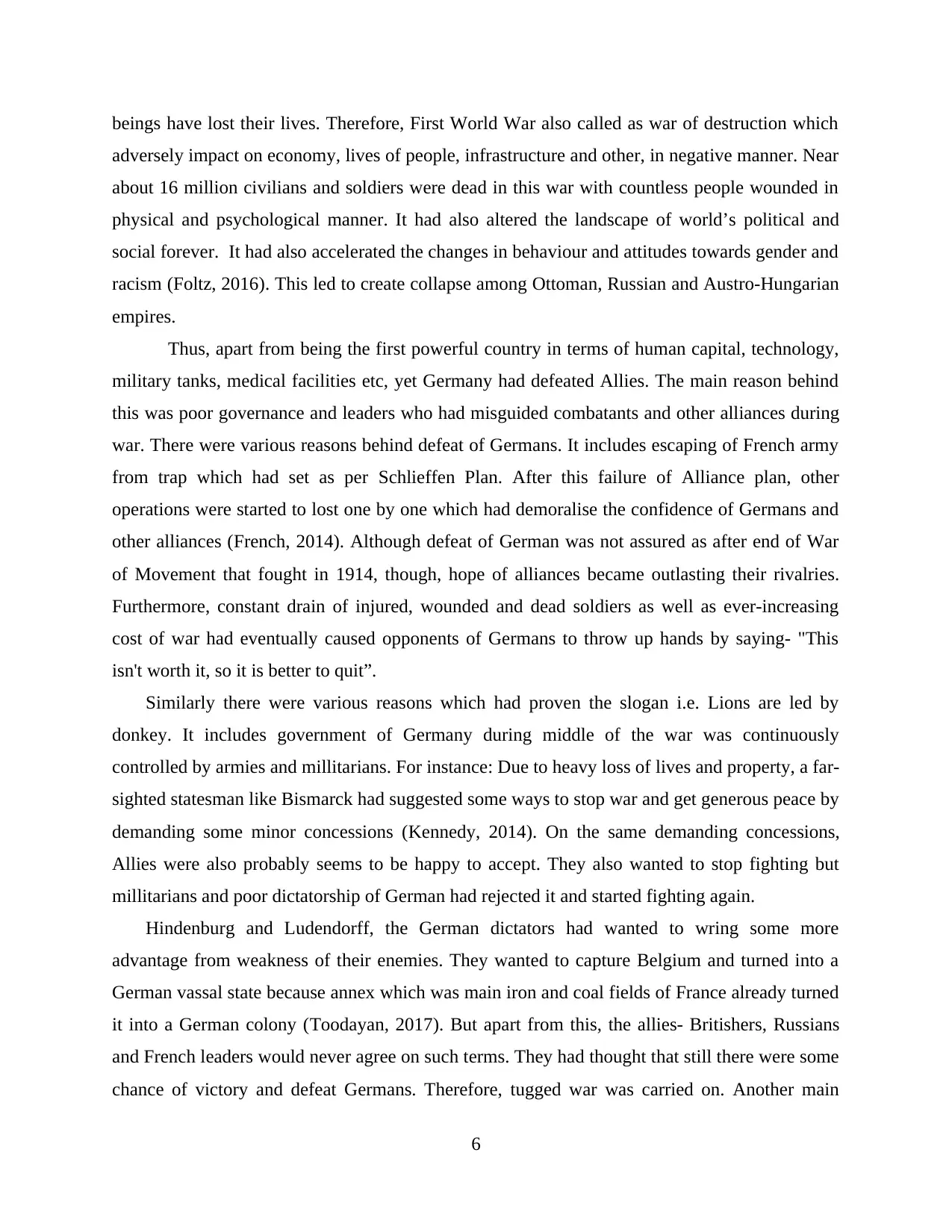
beings have lost their lives. Therefore, First World War also called as war of destruction which
adversely impact on economy, lives of people, infrastructure and other, in negative manner. Near
about 16 million civilians and soldiers were dead in this war with countless people wounded in
physical and psychological manner. It had also altered the landscape of world’s political and
social forever. It had also accelerated the changes in behaviour and attitudes towards gender and
racism (Foltz, 2016). This led to create collapse among Ottoman, Russian and Austro-Hungarian
empires.
Thus, apart from being the first powerful country in terms of human capital, technology,
military tanks, medical facilities etc, yet Germany had defeated Allies. The main reason behind
this was poor governance and leaders who had misguided combatants and other alliances during
war. There were various reasons behind defeat of Germans. It includes escaping of French army
from trap which had set as per Schlieffen Plan. After this failure of Alliance plan, other
operations were started to lost one by one which had demoralise the confidence of Germans and
other alliances (French, 2014). Although defeat of German was not assured as after end of War
of Movement that fought in 1914, though, hope of alliances became outlasting their rivalries.
Furthermore, constant drain of injured, wounded and dead soldiers as well as ever-increasing
cost of war had eventually caused opponents of Germans to throw up hands by saying- "This
isn't worth it, so it is better to quit”.
Similarly there were various reasons which had proven the slogan i.e. Lions are led by
donkey. It includes government of Germany during middle of the war was continuously
controlled by armies and millitarians. For instance: Due to heavy loss of lives and property, a far-
sighted statesman like Bismarck had suggested some ways to stop war and get generous peace by
demanding some minor concessions (Kennedy, 2014). On the same demanding concessions,
Allies were also probably seems to be happy to accept. They also wanted to stop fighting but
millitarians and poor dictatorship of German had rejected it and started fighting again.
Hindenburg and Ludendorff, the German dictators had wanted to wring some more
advantage from weakness of their enemies. They wanted to capture Belgium and turned into a
German vassal state because annex which was main iron and coal fields of France already turned
it into a German colony (Toodayan, 2017). But apart from this, the allies- Britishers, Russians
and French leaders would never agree on such terms. They had thought that still there were some
chance of victory and defeat Germans. Therefore, tugged war was carried on. Another main
6
adversely impact on economy, lives of people, infrastructure and other, in negative manner. Near
about 16 million civilians and soldiers were dead in this war with countless people wounded in
physical and psychological manner. It had also altered the landscape of world’s political and
social forever. It had also accelerated the changes in behaviour and attitudes towards gender and
racism (Foltz, 2016). This led to create collapse among Ottoman, Russian and Austro-Hungarian
empires.
Thus, apart from being the first powerful country in terms of human capital, technology,
military tanks, medical facilities etc, yet Germany had defeated Allies. The main reason behind
this was poor governance and leaders who had misguided combatants and other alliances during
war. There were various reasons behind defeat of Germans. It includes escaping of French army
from trap which had set as per Schlieffen Plan. After this failure of Alliance plan, other
operations were started to lost one by one which had demoralise the confidence of Germans and
other alliances (French, 2014). Although defeat of German was not assured as after end of War
of Movement that fought in 1914, though, hope of alliances became outlasting their rivalries.
Furthermore, constant drain of injured, wounded and dead soldiers as well as ever-increasing
cost of war had eventually caused opponents of Germans to throw up hands by saying- "This
isn't worth it, so it is better to quit”.
Similarly there were various reasons which had proven the slogan i.e. Lions are led by
donkey. It includes government of Germany during middle of the war was continuously
controlled by armies and millitarians. For instance: Due to heavy loss of lives and property, a far-
sighted statesman like Bismarck had suggested some ways to stop war and get generous peace by
demanding some minor concessions (Kennedy, 2014). On the same demanding concessions,
Allies were also probably seems to be happy to accept. They also wanted to stop fighting but
millitarians and poor dictatorship of German had rejected it and started fighting again.
Hindenburg and Ludendorff, the German dictators had wanted to wring some more
advantage from weakness of their enemies. They wanted to capture Belgium and turned into a
German vassal state because annex which was main iron and coal fields of France already turned
it into a German colony (Toodayan, 2017). But apart from this, the allies- Britishers, Russians
and French leaders would never agree on such terms. They had thought that still there were some
chance of victory and defeat Germans. Therefore, tugged war was carried on. Another main
6
⊘ This is a preview!⊘
Do you want full access?
Subscribe today to unlock all pages.

Trusted by 1+ million students worldwide
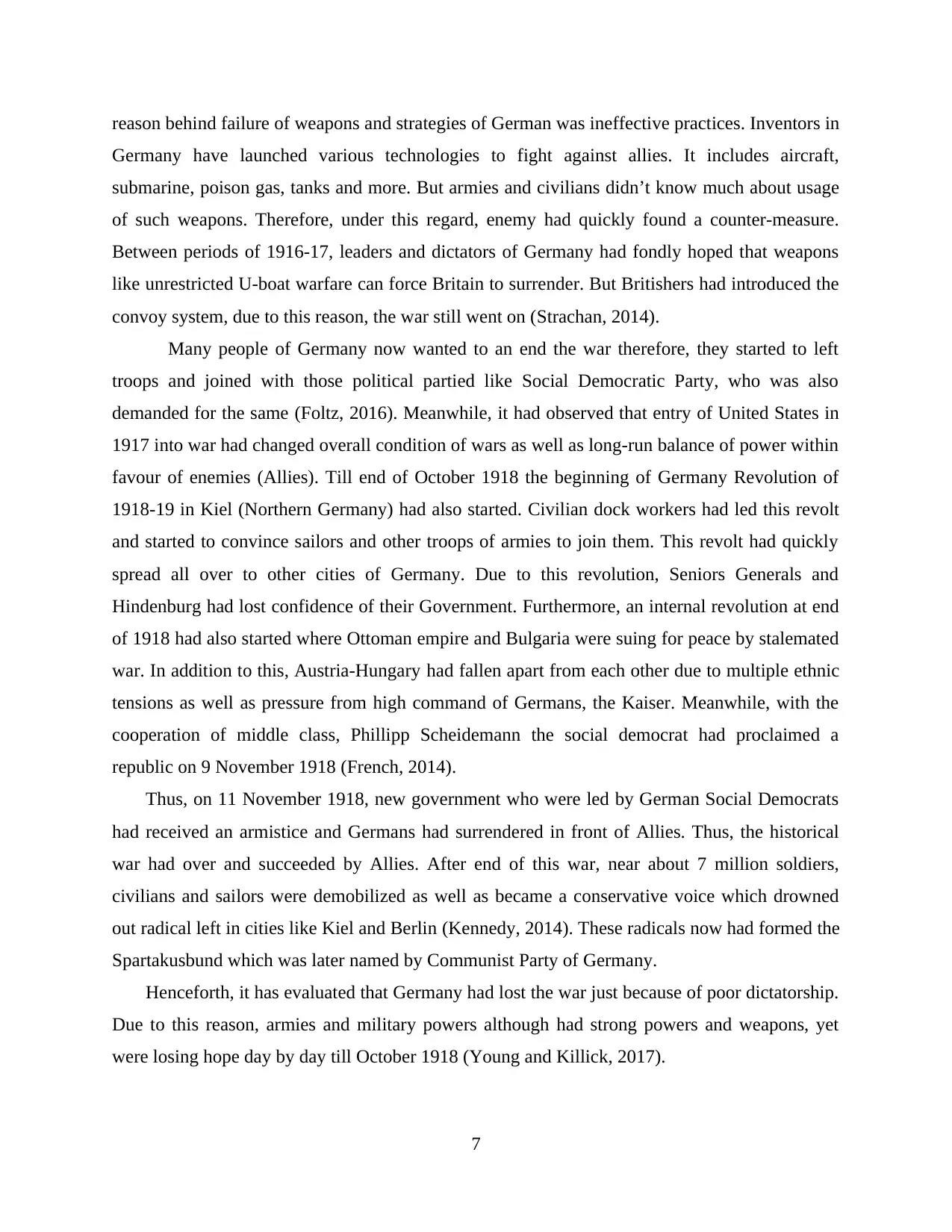
reason behind failure of weapons and strategies of German was ineffective practices. Inventors in
Germany have launched various technologies to fight against allies. It includes aircraft,
submarine, poison gas, tanks and more. But armies and civilians didn’t know much about usage
of such weapons. Therefore, under this regard, enemy had quickly found a counter-measure.
Between periods of 1916-17, leaders and dictators of Germany had fondly hoped that weapons
like unrestricted U-boat warfare can force Britain to surrender. But Britishers had introduced the
convoy system, due to this reason, the war still went on (Strachan, 2014).
Many people of Germany now wanted to an end the war therefore, they started to left
troops and joined with those political partied like Social Democratic Party, who was also
demanded for the same (Foltz, 2016). Meanwhile, it had observed that entry of United States in
1917 into war had changed overall condition of wars as well as long-run balance of power within
favour of enemies (Allies). Till end of October 1918 the beginning of Germany Revolution of
1918-19 in Kiel (Northern Germany) had also started. Civilian dock workers had led this revolt
and started to convince sailors and other troops of armies to join them. This revolt had quickly
spread all over to other cities of Germany. Due to this revolution, Seniors Generals and
Hindenburg had lost confidence of their Government. Furthermore, an internal revolution at end
of 1918 had also started where Ottoman empire and Bulgaria were suing for peace by stalemated
war. In addition to this, Austria-Hungary had fallen apart from each other due to multiple ethnic
tensions as well as pressure from high command of Germans, the Kaiser. Meanwhile, with the
cooperation of middle class, Phillipp Scheidemann the social democrat had proclaimed a
republic on 9 November 1918 (French, 2014).
Thus, on 11 November 1918, new government who were led by German Social Democrats
had received an armistice and Germans had surrendered in front of Allies. Thus, the historical
war had over and succeeded by Allies. After end of this war, near about 7 million soldiers,
civilians and sailors were demobilized as well as became a conservative voice which drowned
out radical left in cities like Kiel and Berlin (Kennedy, 2014). These radicals now had formed the
Spartakusbund which was later named by Communist Party of Germany.
Henceforth, it has evaluated that Germany had lost the war just because of poor dictatorship.
Due to this reason, armies and military powers although had strong powers and weapons, yet
were losing hope day by day till October 1918 (Young and Killick, 2017).
7
Germany have launched various technologies to fight against allies. It includes aircraft,
submarine, poison gas, tanks and more. But armies and civilians didn’t know much about usage
of such weapons. Therefore, under this regard, enemy had quickly found a counter-measure.
Between periods of 1916-17, leaders and dictators of Germany had fondly hoped that weapons
like unrestricted U-boat warfare can force Britain to surrender. But Britishers had introduced the
convoy system, due to this reason, the war still went on (Strachan, 2014).
Many people of Germany now wanted to an end the war therefore, they started to left
troops and joined with those political partied like Social Democratic Party, who was also
demanded for the same (Foltz, 2016). Meanwhile, it had observed that entry of United States in
1917 into war had changed overall condition of wars as well as long-run balance of power within
favour of enemies (Allies). Till end of October 1918 the beginning of Germany Revolution of
1918-19 in Kiel (Northern Germany) had also started. Civilian dock workers had led this revolt
and started to convince sailors and other troops of armies to join them. This revolt had quickly
spread all over to other cities of Germany. Due to this revolution, Seniors Generals and
Hindenburg had lost confidence of their Government. Furthermore, an internal revolution at end
of 1918 had also started where Ottoman empire and Bulgaria were suing for peace by stalemated
war. In addition to this, Austria-Hungary had fallen apart from each other due to multiple ethnic
tensions as well as pressure from high command of Germans, the Kaiser. Meanwhile, with the
cooperation of middle class, Phillipp Scheidemann the social democrat had proclaimed a
republic on 9 November 1918 (French, 2014).
Thus, on 11 November 1918, new government who were led by German Social Democrats
had received an armistice and Germans had surrendered in front of Allies. Thus, the historical
war had over and succeeded by Allies. After end of this war, near about 7 million soldiers,
civilians and sailors were demobilized as well as became a conservative voice which drowned
out radical left in cities like Kiel and Berlin (Kennedy, 2014). These radicals now had formed the
Spartakusbund which was later named by Communist Party of Germany.
Henceforth, it has evaluated that Germany had lost the war just because of poor dictatorship.
Due to this reason, armies and military powers although had strong powers and weapons, yet
were losing hope day by day till October 1918 (Young and Killick, 2017).
7
Paraphrase This Document
Need a fresh take? Get an instant paraphrase of this document with our AI Paraphraser
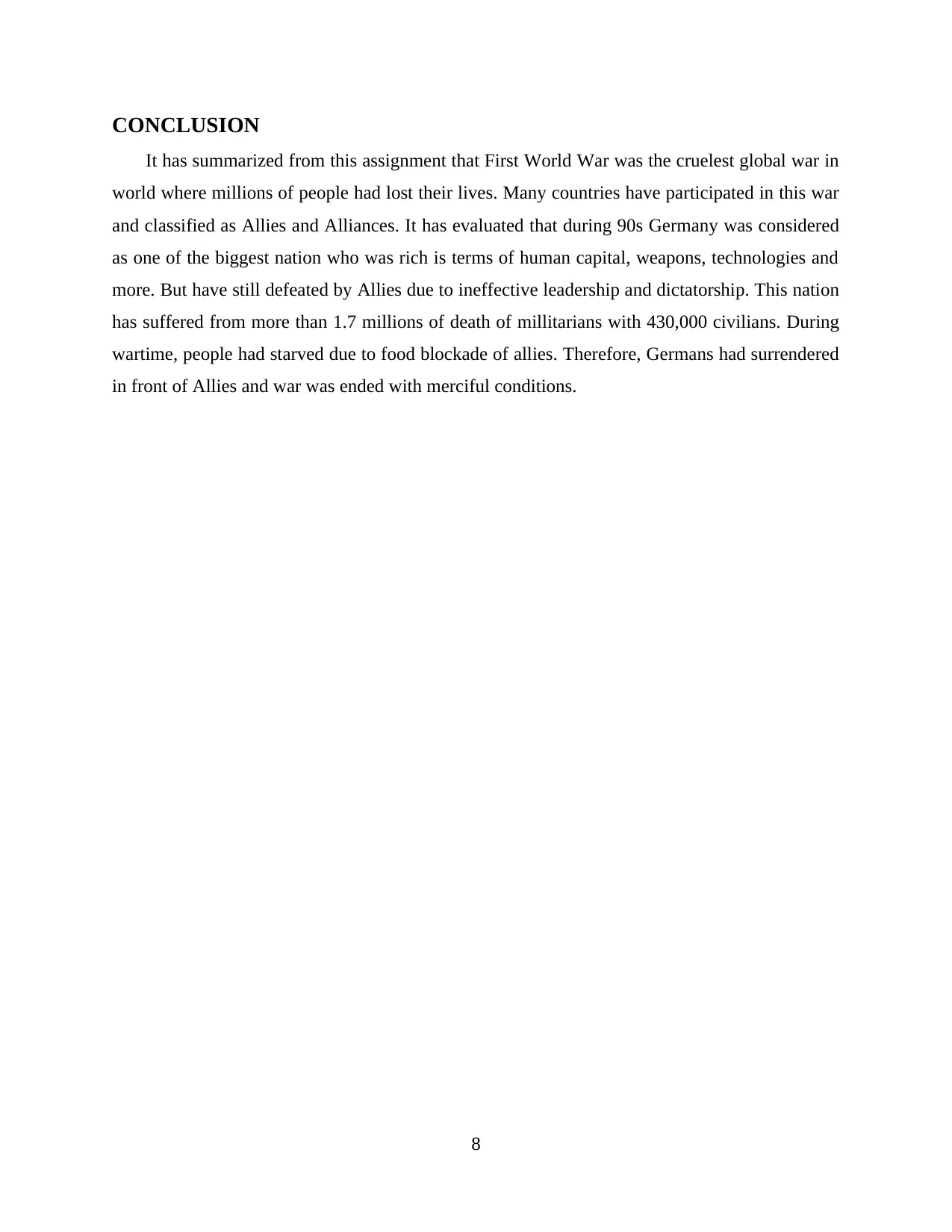
CONCLUSION
It has summarized from this assignment that First World War was the cruelest global war in
world where millions of people had lost their lives. Many countries have participated in this war
and classified as Allies and Alliances. It has evaluated that during 90s Germany was considered
as one of the biggest nation who was rich is terms of human capital, weapons, technologies and
more. But have still defeated by Allies due to ineffective leadership and dictatorship. This nation
has suffered from more than 1.7 millions of death of millitarians with 430,000 civilians. During
wartime, people had starved due to food blockade of allies. Therefore, Germans had surrendered
in front of Allies and war was ended with merciful conditions.
8
It has summarized from this assignment that First World War was the cruelest global war in
world where millions of people had lost their lives. Many countries have participated in this war
and classified as Allies and Alliances. It has evaluated that during 90s Germany was considered
as one of the biggest nation who was rich is terms of human capital, weapons, technologies and
more. But have still defeated by Allies due to ineffective leadership and dictatorship. This nation
has suffered from more than 1.7 millions of death of millitarians with 430,000 civilians. During
wartime, people had starved due to food blockade of allies. Therefore, Germans had surrendered
in front of Allies and war was ended with merciful conditions.
8
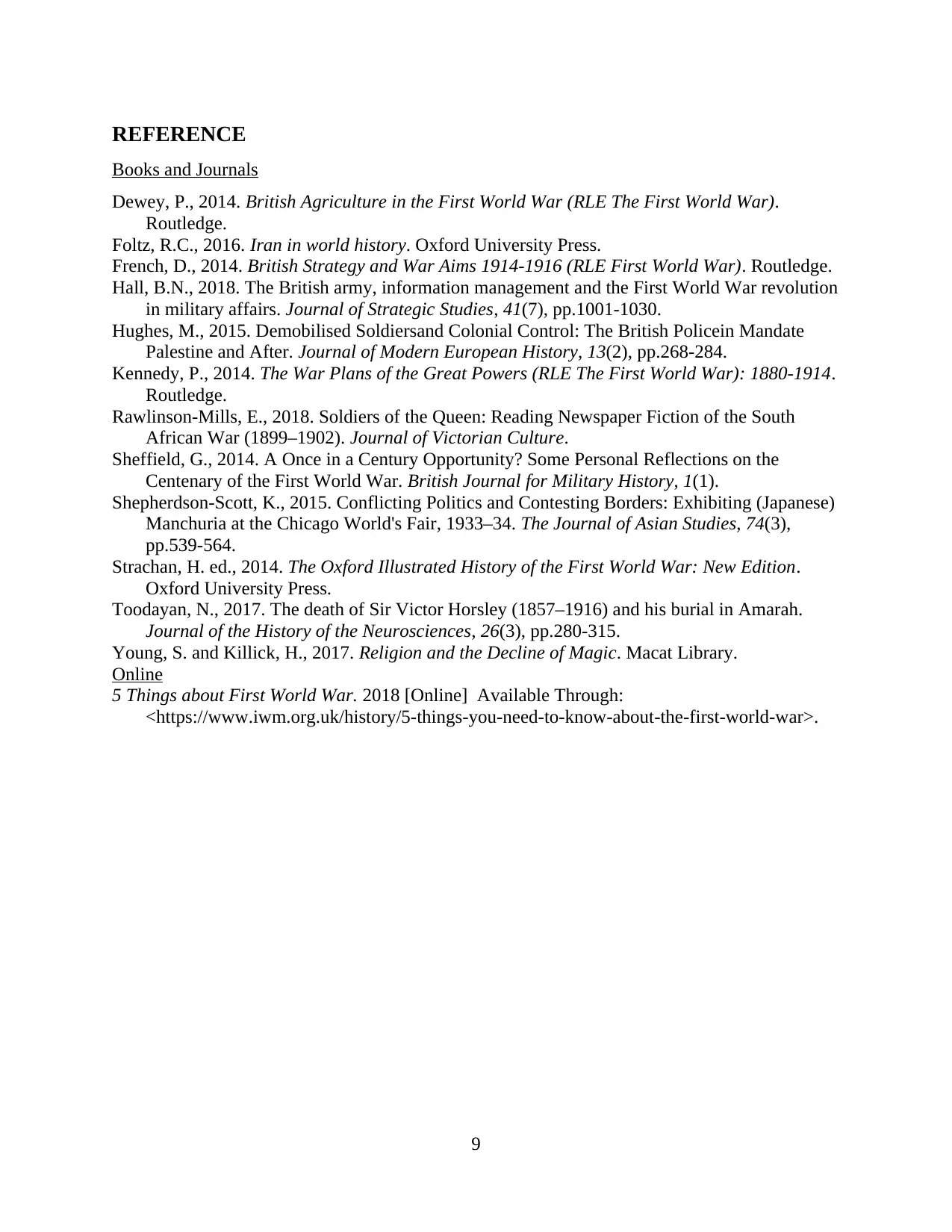
REFERENCE
Books and Journals
Dewey, P., 2014. British Agriculture in the First World War (RLE The First World War).
Routledge.
Foltz, R.C., 2016. Iran in world history. Oxford University Press.
French, D., 2014. British Strategy and War Aims 1914-1916 (RLE First World War). Routledge.
Hall, B.N., 2018. The British army, information management and the First World War revolution
in military affairs. Journal of Strategic Studies, 41(7), pp.1001-1030.
Hughes, M., 2015. Demobilised Soldiersand Colonial Control: The British Policein Mandate
Palestine and After. Journal of Modern European History, 13(2), pp.268-284.
Kennedy, P., 2014. The War Plans of the Great Powers (RLE The First World War): 1880-1914.
Routledge.
Rawlinson-Mills, E., 2018. Soldiers of the Queen: Reading Newspaper Fiction of the South
African War (1899–1902). Journal of Victorian Culture.
Sheffield, G., 2014. A Once in a Century Opportunity? Some Personal Reflections on the
Centenary of the First World War. British Journal for Military History, 1(1).
Shepherdson-Scott, K., 2015. Conflicting Politics and Contesting Borders: Exhibiting (Japanese)
Manchuria at the Chicago World's Fair, 1933–34. The Journal of Asian Studies, 74(3),
pp.539-564.
Strachan, H. ed., 2014. The Oxford Illustrated History of the First World War: New Edition.
Oxford University Press.
Toodayan, N., 2017. The death of Sir Victor Horsley (1857–1916) and his burial in Amarah.
Journal of the History of the Neurosciences, 26(3), pp.280-315.
Young, S. and Killick, H., 2017. Religion and the Decline of Magic. Macat Library.
Online
5 Things about First World War. 2018 [Online] Available Through:
<https://www.iwm.org.uk/history/5-things-you-need-to-know-about-the-first-world-war>.
9
Books and Journals
Dewey, P., 2014. British Agriculture in the First World War (RLE The First World War).
Routledge.
Foltz, R.C., 2016. Iran in world history. Oxford University Press.
French, D., 2014. British Strategy and War Aims 1914-1916 (RLE First World War). Routledge.
Hall, B.N., 2018. The British army, information management and the First World War revolution
in military affairs. Journal of Strategic Studies, 41(7), pp.1001-1030.
Hughes, M., 2015. Demobilised Soldiersand Colonial Control: The British Policein Mandate
Palestine and After. Journal of Modern European History, 13(2), pp.268-284.
Kennedy, P., 2014. The War Plans of the Great Powers (RLE The First World War): 1880-1914.
Routledge.
Rawlinson-Mills, E., 2018. Soldiers of the Queen: Reading Newspaper Fiction of the South
African War (1899–1902). Journal of Victorian Culture.
Sheffield, G., 2014. A Once in a Century Opportunity? Some Personal Reflections on the
Centenary of the First World War. British Journal for Military History, 1(1).
Shepherdson-Scott, K., 2015. Conflicting Politics and Contesting Borders: Exhibiting (Japanese)
Manchuria at the Chicago World's Fair, 1933–34. The Journal of Asian Studies, 74(3),
pp.539-564.
Strachan, H. ed., 2014. The Oxford Illustrated History of the First World War: New Edition.
Oxford University Press.
Toodayan, N., 2017. The death of Sir Victor Horsley (1857–1916) and his burial in Amarah.
Journal of the History of the Neurosciences, 26(3), pp.280-315.
Young, S. and Killick, H., 2017. Religion and the Decline of Magic. Macat Library.
Online
5 Things about First World War. 2018 [Online] Available Through:
<https://www.iwm.org.uk/history/5-things-you-need-to-know-about-the-first-world-war>.
9
⊘ This is a preview!⊘
Do you want full access?
Subscribe today to unlock all pages.

Trusted by 1+ million students worldwide
1 out of 9
Related Documents
Your All-in-One AI-Powered Toolkit for Academic Success.
+13062052269
info@desklib.com
Available 24*7 on WhatsApp / Email
![[object Object]](/_next/static/media/star-bottom.7253800d.svg)
Unlock your academic potential
Copyright © 2020–2026 A2Z Services. All Rights Reserved. Developed and managed by ZUCOL.





